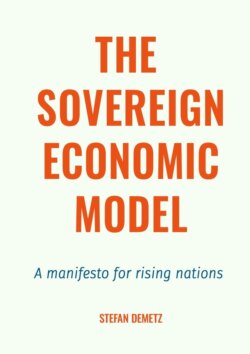Читать книгу The Sovereign Economic Model. A manifesto for rising nations - Stefan Demetz - Страница 8
Politics of the sovereign economic model
Politics and the Sovereign Economic Model
ОглавлениеThe Sovereign Economic Model focuses only on economic theories for strengthening the economy. It is by itself apolitical. It is strongly driven by an attempt to fix the excesses and imbalances of liberal capitalism. The Sovereign Economic Model is not a rejection of capitalism, but an endeavor to improve its efficiency. It implicitly contains many political elements, not because of political inclinations but because economic control also implies political influence. As with any form of sovereignty, it means the country controls processes within its borders. In economic terms, economic sovereignty means a country controls the currency flow within its borders. When someone outside a country controls food, medicines, electronics, industrial production, energy, media, military hardware, land ownership, and other major businesses in that country, it means the country is not in charge of itself or is not sovereign. Therefore, the Sovereign Economic Model implicitly tries to reverse such external control. Through state capitalism, import substitution, market regulation, and industrialization, it tries to move the economic control levers back into the hands of the country and its people.
The Sovereign Economic Model also has a preponderant long-term view of economic well-being in terms of independence, self-sufficiency, and stability. Simultaneously, it tries to capture and keep the wealth created in the country. Increased competition is not a welcome concept for many of the largest international industry players and for countries with such industries. Thus, a country that follows this path faces very intense pressure. It is therefore criticized, despised, and ostracized in both the media and academia by most economic experts and stakeholders. It is sad to see that only a few countries, such as China, Russia, India (partially), and Iran, have sovereign economic policies. Others, willingly or unwillingly, have given up economic control of their country. This negatively affects their economies in the longer term.
The political implications of the Sovereign Economic Model also have an unintended political angle for countries that want to retake the reins of their economies to organize amended mechanisms suitable for local conditions. Some countries have more «socialist» inclinations. Russian President Vladimir Putin has several times mentioned the «social obligations» of businesses; in China, President Xi Jinping and the Chinese Communist Party created the concept of «common prosperity» in 2021. Both of these leaders want to remove their economies from the «liberal order» -defined status quo and its economic modus operandi. Both want to create their own flavor that is more beneficial to their own country and its citizens.
In countries like the US, economic nationalism, with mottoes such as «Made in USA,» «Buy American,» and «American jobs» still stir up a sort of nationalistic, patriotic sentiment in some people. It is comparable to the Palestinian Boycott, Divestment, and Sanctions (BDS) Movement, but generalized against any foreign brands or goods.
Many think that import substitution is economic isolation, that it means blocking off all imports and becoming an economic hermit. This is not true unless complete sanctions or an embargo are involved. Sometimes there are sectoral sanctions, in which case that delimited part of the economy struggles. The import substitution relies on established supply chains and slowly starts to «indigenize» the supply chains into domestic ones. So, an industry begins with low-level economic activity and assembly of parts and only slowly, at a later stage, replaces the entire stack of suppliers with local companies. Also, usually imports are still allowed, but with high custom excises.
For some countries, especially those in Africa, a sovereign economy with import substitution was part of the plan to gain economic independence in the 1960s. So, after they achieved independence, political emancipation gave way to certain policies. These were decided upon and implemented, but without planning and foreign interference, they produced little progress.
A political will to improve the national economy is needed, and many reasons and slogans are declared, but generally no real changes occur because the status quo is convenient to most. That needs to change.
